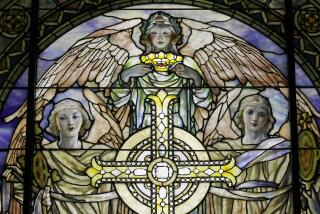COMMENTARY : New Age Beliefs Are Really Quite Old
- Share via
Is there anything new about the New Age?
When it comes to assessing the reach of the so-called New Age, numbers are frustratingly difficult to come by. Although many observers describe the movement as the religion of the 1980s, the New Age has no church or denomination, no Pope or high priest, unless you count Shirley MacLaine.
The term denotes an eclectic range of beliefs and practices, from astrological horoscopes and communication with departed spirits to extrasensory perception and holistic health. The categories are slippery, and so coming up with a definition, let alone reliable statistics, is very much like eating a bowl of spaghetti with your fingers.
Despite the difficulties, polling data released recently by the Princeton Religion Research Center suggests some fascinating contradictions. The study showed that “a surprisingly high number” of Christians identify with beliefs generally described as New Age. At the same time, however, many Christians have doubts that New Age spirituality is compatible with Christianity.
Among Catholics, 59% said they consider New Age beliefs to be compatible with Christianity, compared with 23% of Protestants.
While I have always thought that the influence of New Age is overrated, it does rank with the prosperity gospel as one of two religious developments most suited to Ronald Reagan’s America. It strikes me as no accident whatsoever that the 1980s spawned two religions that appealed to self-interest: the God-will-make-you-rich-and-happy Pablum of the televangelists and the I-can-do-this-on-my-own spirituality of the New Agers. Both elevated individuality over community, self-aggrandizement over altruism, eclecticism over orthodoxy.
Is there anything novel about that? Hardly. Recent research into the religious life of Colonial America has shown that the earliest settlers also consulted astrological charts. Belief in magic, divination and witchcraft was almost universal. These trends continued throughout the 19th Century. To cite one of many examples, Joseph Smith, credited by Mormons with finding golden tablets containing the Book of Mormon, used divining rods and various other magical devices to search for buried treasure. Spiritualism and theosophy claimed thousands of followers after the Civil War.
Ill-defined beliefs in the supernatural, often held in conjunction with more orthodox doctrines, have persisted well into the latter stages of the 20th Century. And they show no signs of abating.
The so-called New Age religions are only the most recent example of this durable strain of spiritual eclecticism. In the long range of history there was nothing unique about the eruption of New Age sensibilities in the 1980s.
What was unique about New Age was the extent to which its practitioners were able to capture the imagination of the larger culture. MacLaine’s books, which lent new meaning to the term self-indulgence , became bestsellers.
Channeling, the practice of purportedly communicating with long-departed spirits through a medium, evolved into a big business. And who can forget that assault on the senses called New Age music, that strange collection of sounds with the musical consistency of a pulp novel?
Therein lay the novelty of the New Age: its ability to win cultural respectability and acceptance, whether on the radio airwaves, the talk-show circuit or the bestseller list.
What happens now? Will New Age religion retreat into back rooms or quietly find its place in the archives alongside the other excesses of the ‘80s?
When it comes to New Age music, we dare to hope for its speedy demise. But it’s hard to work up any such optimism about folk religion in general. Beliefs and practices related to the supernatural and occult, whatever names they go by, will persist in capturing the popular imagination, despite efforts of religious leaders to quash them. And many people will fail to see contradictions between those beliefs and practices and the orthodox teachings of Christianity.
More to Read
Sign up for Essential California
The most important California stories and recommendations in your inbox every morning.
You may occasionally receive promotional content from the Los Angeles Times.













